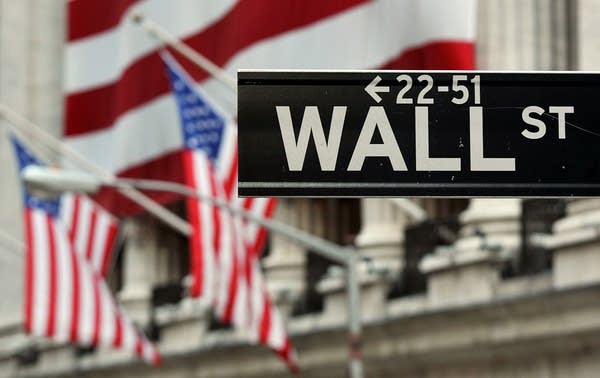Worst loss for Dow this year as stocks slump again
Go Deeper.
Create an account or log in to save stories.
Like this?
Thanks for liking this story! We have added it to a list of your favorite stories.

By CHRISTINA REXRODE, AP Business Writer
NEW YORK (AP) — The stock market extended its longest and deepest slump of the year Tuesday, caught between a recurring nightmare of European debt and the beginning of uncertain corporate earnings reports at home.
The Dow Jones industrial average fell 213.66 points, its biggest decline of the year and third triple-digit loss in four days. It closed at 12,715.93, its lowest since Feb. 2.
A five-day losing streak has shaved about 550 points off the Dow, about half what it gained from January through March.
Turn Up Your Support
MPR News helps you turn down the noise and build shared understanding. Turn up your support for this public resource and keep trusted journalism accessible to all.
In Europe, concern about the financial health of Spain intensified, and borrowing costs for both Spain and Italy rose considerably. Spain's borrowing costs crept closer to levels that forced other countries to seek bailouts.
European markets sold off while Wall Street was still sleeping. The main stock indexes in Spain and France closed down about 3 percent, the equivalent of a 400-point drop in the Dow.
"They've managed to put a Band-Aid on the debt crisis, but there's really no solution," said Colleen Supran, a principal at the investment adviser Bingham, Osborn & Scarborough. "And Spain is a much bigger problem than Greece."
The yield on 10-year Spanish bonds rose to almost 6 percent. The point at which governments can no longer afford to raise money on the international bond markets and must seek bailouts is generally considered to be 7 percent.
The 7 percent level forced Greece, the last focal point of the European debt crisis, to seek rescue loans. But Spain's economy is more than five times as large as Greece's.
Jeffrey Cleveland, senior economist at Payden & Rygel in Los Angeles, compared the financial markets to a person coming off a sugar high - in this case, the bailout package for Greece put together late last year.
"It works for a few minutes, but eventually reality reasserts itself," Cleveland said. "Nothing has been solved in Europe. People are paying attention to it now. They were able to ignore it for a little while."
In the United States, stock in Alcoa, the aluminum company, surged 5.3 percent after the market closed. Minutes after the closing bell, the company reported profit of 9 cents per share. Analysts expected a loss of 4 cents.
Alcoa was the first of the 30 stocks in the Dow to report its quarterly results, and earnings will help determine whether the market continues its slide or reverses it.
After nine consecutive quarters of earnings growth, analysts think earnings will be flat this time. Those predictions came before Alcoa's impressive results, however.
"Whatever qualifications you want to give it - it's because of cost-cutting, they've laid off a lot of people - earnings have been one bright spot," said Adrian Day, president of Adrian Day Asset Management in Annapolis, Md. "If that were to turn, that would be sort of the last leg on the stool being knocked away."
The first three months of this year were the best for stocks since 1998, but investors have found plenty to fret about in April.
The losing streak began last Tuesday, when the Federal Reserve said it was worried about the strength of job growth and suggested it was not inclined to provide further help for the economy.
The Dow fell 204 points in three days. It fell 131 more on Monday, the first time investors could react to a report showing much weaker job growth in March than in the three previous months.
Then, on Tuesday, the National Federation of Independent Business reported a drop in its small-business optimism index, the first decline after six months of gains.
That report helped knock stocks down at the open, and with Europe to worry about, they sank all day. The S&P finished down 23.61 points, its worst one-day decline this year, at 1,358.59.
The Nasdaq composite index, which eked out a gain in one of the past four days, ended down 55.86 points, iIran. Talks on Iran's nuclear program are scheduled for Saturday.
On Tuesday, the dollar and U.S. Treasury prices rose as investors shifted money into lower-risk investments. The yield on the benchmark 10-year Treasury note fell for the fifth straight day, dropping to 1.99 percent from 2.04 percent Monday.
Among stocks making big moves:
- Supervalu Inc., the grocery chain that owns Albertsons and Jewel-Osco, climbed 15 percent. The company reported a quarterly loss but outlined turnaround plans that include closing stores and slashing jobs.
- Best Buy fell almost 6 percent after announcing that its chief executive had resigned without a permanent successor. The electronics giant is struggling for market share in a retail world that's been shaken up by online companies like Amazon.
---
AP Economics Writer Christopher S. Rugaber contributed to this report from Washington.





